
Deep-frying is a quick and convenient method of cooking -- using oil as a medium -- at high temperatures of 347 to 392 degrees Fahrenheit, which imparts a crisp texture and distinctive flavor to the fried foods. Frying is comparable to other methods of cooking where some loss of fat-soluble vitamins takes place, but most of the nutrients remain intact. The short transit time of the frying process allows for retention of most of the heat-sensitive vitamins, such as the B-complex group, vitamin C, minerals and protein.
Vitamins
Water-soluble vitamins such as B-1, B-2, B-6 and C are better retained in food through frying than in boiling, steaming or stewing. According to a 1998 study in the "International Journal of Food Science and Nutrition," vitamin C concentrations of french-fried potatoes were found to be as high as in raw potatoes, and vitamin B-1 content was also maintained in fried potato products. Retention of vitamin C was greatest when the potatoes were cooked rapidly in deep fat and lowest when they were cooked slowly in shallow fat. Deep-frying can cause loss of vitamin A, a fat-soluble vitamin, which leaches out in the oil or may be destroyed by the high temperature during frying.
Minerals
Minerals are very stable during high-temperature cooking, and heating does not destroy minerals at least up to 752 degree Fahrenheit. A study by Kyoto University in Japan found that to reduce mineral loss from vegetables, stewing, parching or frying are better cooking options than boiling. The rapid cooking of foods during frying and the low solubility of minerals in oil reduces their loss to a minimum.
Protein and Fiber
Frying has little or no impact on the protein content of fried food, according to a 2010 article in the journal "Romanian Biotechnological Letters." By contrast, the dietary fiber content of fried potatoes -- such as french fries -- is increased after frying due to the formation of resistant starch. Consuming fiber can boost your health because dietary fiber helps prevent diseases such as colon cancer, cardiovascular disease and diabetes.
Vitamin E
Vegetable frying oils are an excellent source of vitamin E. Fried foods are enriched with considerable amounts of this vitamin due to oil uptake during the frying process. For instance, a 100-gram serving of french fries provides up to 50 percent of the recommended daily allowances of this vitamin. Oxidation during frying leads to loss of vitamin E from the frying oil, and repeated use of oil will further diminish the vitamin content, which in turn affects the net intake of vitamin E from fried foods. Apart from this, the nutritional quality of oil is also affected by loss of polyunsaturated fatty acids, which are sources of essential fatty acids in your diet.
Related Articles
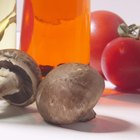
Mineral Oil Vs. Olive Oil

Steaming vs. Boiling vs. Baking Carrots
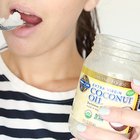
Skin Benefits of Eating Coconut Oil

Asian Secret to Removing Cellulite

What Is Expeller Pressed Canola Oil?

What Type of Oil Can I Use to Deep Fry ...
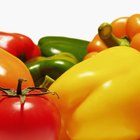
Nutrition Facts About Raw or Cooked ...
Essential Amino Acids That Are ...
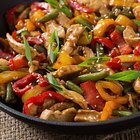
Calories in Moo Shu Vegetable

Which Cooking Oil Can You Use on the ...

Which Vegetables Produce the Most ...

What Foods Provide Calcium D-Glucarate?

What Are the Benefits of Krill Oil on ...
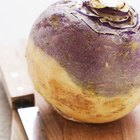
How to Cook French-Fried Turnips
Substitutes for Olive Oil in Cooking

Strontium-Rich Foods
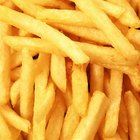
What Is Oil Blanching?
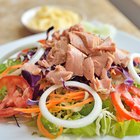
The Benefits of Tuna & Omega-3 Oil

The Average Weight of a Boiled Egg

How Much Oil in a Pan to Fry Chicken ...
References
- Grasas y Aceites: Minerals
- International Journal of Food Sciences and Nutrition: Nutrient Losses and Gains During Frying: A Review
- Journal Nutr Sci Vitaminol (Tokyo): Cooking Losses of Minerals in Foods and Its Nutritional Significance
- Fox and Cameron's Food Science, Nutrition & Health; Brian Anthony Fox and Allan Gillies Cameron
- Romanian Biotechnological Letters: Nutritional and Health Aspects Related to Frying
- Journal of the American Oil Chemist's Society: Changes in the Characteristics and Compositions of Oil During Deep-Fat Frying
Writer Bio
Shweta Singh is a dietitian, health writer and an expert on holistic healing and disease prevention.She holds a Doctorate degree in alternative medicine and has clinical experience working as a diet and health counselor. Her work has appeared on LIVESTRONG and she has also contributed for academic books on Food and Nutrition.
Photo Credits
Jupiterimages/Photos.com/Getty Images